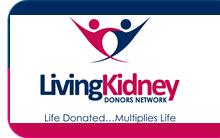
Living Donor Info. Links:
“No one is useless in this world who lightens the burdens of another.” ― Charles Dickens
PLEASE GIVE THE
GIFT OF LIFE
Spread the Word:
Goal
New Kidney, New Life!
Click links on this page to learn about being a kidney donor.
Thank you!
**To get tested for donor match, Fill Out the Questionnaire Below and Contact the Penn Living Donor Coordinator at 215-662-6200.
Tell them you want to help Kevin!
*We've been advised to prepare for additional/unexpected expenses due to Kevin's illness. If you'd like to help, our friends have set up a GoFundMe account on our behalf.*
Thank you.... <3
We wake up each day and are thankful for what we have. We always know that someone somewhere is fighting just to survive.
Blessed are those who can give without remembering, and take without forgetting.
LIVING DONOR Q & A
Q. Why is a kidney transplant from a living donor better than one from a deceased donor?
Kidney donation from a living donor provides some major benefits for individuals with renal failure. Data shows that a living donor kidney not only functions better, but it lasts longer. Overall, benefits of a living donor transplant include:
-
Better long term transplant kidney survival (live kidneys last longer than deceased kidneys);
-
Ability to schedule procedure at a time that is convenient for both donor and recipient;
-
Possibility to avoid dialysis;
-
A reduced risk of rejection.
Q. What does it take to be a kidney donor?
A living kidney donor should be between the ages 21 to 60, in excellent health, and have a blood type compatible with your intended recipient (in Kevin's case A or O, +/- doesn't matter). Donors over age 61-65 are considered on a case by case basis. A history of heart disease, chronic lung or liver disease, kidney disease, hypertension, diabetes, cancer or untreated psychiatric disease is usually a contraindication to donating (i.e. the donor candidate is "ruled out"). Smoking, obesity and other health issues are considered on an individual basis. The process is started by filling out a questionnaire. If your blood type is not compatible, you will be given the option of being part of a kidney exchange within the Hospital of the University of Pennsylvania or being entered into the national registries in which they belong.
Q. What does kidney transplant surgery involve?
The surgical procedure to remove a kidney from the donor is called a donor nephrectomy and takes approximately 2-3 hours. Surgeons primarily use a minimally invasive technique, using 3 small incisions to insert instruments and a slightly larger incision to remove the donor's kidney. Typically donors spend 2-3 days in recovery before being discharged from the hospital.
Because the kidney donor operation is a major surgical procedure, donors find they have less energy and need about 4-6 weeks to return to their full pre-surgical activity level. For donors who worked prior to surgery, disability coverage allows 6 weeks off for recovery; however, some donors return to work before this time.
Two to three weeks following a donor's discharge from the hospital, the donor is asked to return to the hospital for a medical exam. Six, 12 and 24 months following donation, donors are asked to complete lab work and a questionnaire. The transplant team also encourages donors to have regular appointments with a primary care provider.
Q. What risks are there to kidney donors?
Once a living donor candidate has been completely evaluated and cleared, the chance of the donation affecting his/her lifespan or lifestyle is extremely low. With any surgery and anesthesia, however, there are risks. Nationally, the risk of having a life-threatening problem with donating a kidney is 1 in 3,000. The risk of minor complications such as a minor wound infection is about 2-4%.
Q. Who pays for a donor's medical costs?
All expenses for the medical work-up and transplant surgery are covered by the recipient's health insurance. In considering donation, candidates need to consider additional expenses such as:
-
Travel to transplant hospital
-
Parking, lodging, gas, bridge tolls and other incidentals
-
Lost wages if sick time or short-term disability from work is not available.
UPenn social workers can discuss your specific circumstances in more detail and find ways to help with the additional expenses.
Q. Can a female donor have children after donating a kidney?
Women of childbearing age can have children after kidney donation because the donor surgery does not affect their reproductive organs.
Q. What is the long-term outcome for kidney donors?
It is important to note that all potential living donors undergo a thorough screening and evaluation to ensure your safety in this process. While studies have shown that there is no long-term ill effect on the health of a donor or the remaining kidney, living kidney donation is not completely risk-free for the donor or the recipient. In order to ensure your ongoing health and well-being as a living donor, UPenn has an established multidisciplinary donor team as well as thorough donor evaluation protocols that are designed specifically to make sure it is safe for you to be a donor. All of your health information is reviewed and discussed with the multidisciplinary team. Your private health information will be kept confidential and can only be shared with your signed approval.






